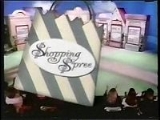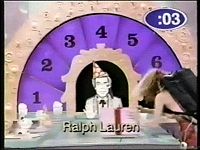
Shopping Spree
Encyclopedia
Shopping Spree is a game show that aired on the Family Channel for two seasons from September 30, 1996 to August 14, 1998. It was hosted by Ron Pearson
, announced by Burton Richardson and produced by Jay Wolpert
Enterprises and MTM Enterprises
.
 Prior to the show, one contestant from each team was shown the six stores, and from each store chose one prize they would like to have. At the beginning of the round, one player was isolated while the other stood on a pedestal in the "town square" at center stage wearing various objects on his/her body that would give clues to their partner about the prizes he/she selected. The player and host Pearson went over the items the contestant was wearing.
Prior to the show, one contestant from each team was shown the six stores, and from each store chose one prize they would like to have. At the beginning of the round, one player was isolated while the other stood on a pedestal in the "town square" at center stage wearing various objects on his/her body that would give clues to their partner about the prizes he/she selected. The player and host Pearson went over the items the contestant was wearing.
At this point, a randomly selected member of the studio audience helped to reveal the six stores for that day's show. This audience member was always referred to as "Denise DuJour" or "Dennis DuJour", depending on their gender. After the prizes and stores were revealed, the contestant was asked to strike a pose, after which the contestant's partner was brought out. The partner was given 20 seconds to analyze the items on the posing contestant. When the 20 seconds expired, the contestant was released from his/her pose and met his/her partner for the first time. However, if the dressed contestant makes a gesture or other action that would lead to a hint, that team was assessed a 10-second penalty.
On Pearson's cue, the partner ran to the first store, chose one of the four prizes and ran back with it to show what prize he/she chose. If the prize the partner chose matches the first contestant's choice, a bell rang, the partner put the prize in the over-sized shopping bag and moved on to the next store. If the partner is wrong, a buzzer sounded, he/she had to listen to a clue posed by Pearson, then returned to that store and chose another prize. The first team established a time for the second team to beat, and the clock stopped after all six stores were completed.
After a commercial break, the second team attempted to beat the first team's time in the manner described. The runner on the winning team received a $500 shopping spree, and their partner kept the prizes they chose. In addition, the winning team advanced to the Birthday Party.
 After the team listened to a description of the potential bonus prize, the three pieces of the set rotated 180 degrees to reveal the Birthday Party. The left panel revealed the playing area, the center piece held a large representation of a birthday cake
After the team listened to a description of the potential bonus prize, the three pieces of the set rotated 180 degrees to reveal the Birthday Party. The left panel revealed the playing area, the center piece held a large representation of a birthday cake
, and the rightmost panel held a wall of 12 to 14 items labeled the "Birthday Board".
One team member shopped for gifts and the other had to wrap and deliver them to the celebrities. Pearson showed the contestants and the home audience each item on the Birthday Board. The game began with a caricature of a famous celebrity (real or fictional, past or present) appearing at the end of a table. The shopper took down an item from the board that he/she thought was connected to the celebrity in some way (for example, a swim cap would connect to Janet Evans
, a polo mallet would be connected to Ralph Lauren
, and a chef's hat would be connected to Wolfgang Puck
) and threw it to the wrapper. The wrapper then placed it in the box and slid it down the table to the celebrity. If the team was correct, the gift was accepted and another celebrity appeared; if not, the celebrity "rejected" the gift and pushed it back. Teams could pass and go back to that celebrity if there was any time remaining. Each correct gift was worth $100, and getting all seven gifts within one minute and 15 seconds awarded each team member a vacation package and $1,000 ($2,000 if the team won the Double Up Derby).
During the second season, the shopper could not cross a line on the floor when throwing gifts to the wrapper. If this occurred, a five-second penalty was assessed.
Ron Pearson
Ronald "Ron" Samuel Pearson is an American actor, comedian and world record juggler.He started his career as a stand up comic at night clubs, a warm up guy on numerous shows...
, announced by Burton Richardson and produced by Jay Wolpert
Jay Wolpert
Jay Wolpert is an American television producer and screenwriter.His first television appearance came as a contestant on the original version of Jeopardy! in 1969. He competed in the Jeopardy! Tournament of Champions that year and won....
Enterprises and MTM Enterprises
MTM Enterprises
MTM Enterprises was an American independent production company established in 1969 by Mary Tyler Moore and her then-husband Grant Tinker to produce The Mary Tyler Moore Show for CBS...
.
Premise
Two teams of two unacquainted players went on a shopping spree at six stores, each with four prizes, on a fictional street on stage. The object is to match the desired prizes with visual clues given by the contestant in the quickest amount of time.Main Game

At this point, a randomly selected member of the studio audience helped to reveal the six stores for that day's show. This audience member was always referred to as "Denise DuJour" or "Dennis DuJour", depending on their gender. After the prizes and stores were revealed, the contestant was asked to strike a pose, after which the contestant's partner was brought out. The partner was given 20 seconds to analyze the items on the posing contestant. When the 20 seconds expired, the contestant was released from his/her pose and met his/her partner for the first time. However, if the dressed contestant makes a gesture or other action that would lead to a hint, that team was assessed a 10-second penalty.
On Pearson's cue, the partner ran to the first store, chose one of the four prizes and ran back with it to show what prize he/she chose. If the prize the partner chose matches the first contestant's choice, a bell rang, the partner put the prize in the over-sized shopping bag and moved on to the next store. If the partner is wrong, a buzzer sounded, he/she had to listen to a clue posed by Pearson, then returned to that store and chose another prize. The first team established a time for the second team to beat, and the clock stopped after all six stores were completed.
After a commercial break, the second team attempted to beat the first team's time in the manner described. The runner on the winning team received a $500 shopping spree, and their partner kept the prizes they chose. In addition, the winning team advanced to the Birthday Party.
Bonus round
In the bonus round, titled "the Birthday Party," the contestants chose from among a selection of "gifts" for which celebrities might have a particular use. The game was played for a vacation package and a cash prize.Double Up Derby
Beginning halfway through the first season, the winning team played a game called "Denise/Dennis DuJour's Double Up Derby" to determine how much money they would play for at the Birthday Party. Before the show, that day's Denise/Dennis selected a prize from one of the six stores. The team was given a brief description of Denise/Dennis, and was then asked to guess which prize they believe Denise/Dennis had chosen. If the team guessed correctly, Denise/Dennis won that chosen prize and the team played for $2,000 in addition to a vacation package at the Birthday Party. If they were unsuccessful, the team played for $1,000 and the package. Regardless of the outcome, Denise/Dennis received a $100 salary for the day.Birthday Party

Birthday cake
The birthday cake has been an integral part of the birthday celebrations in Western cultures since the middle of the 19th century. Certain rituals and traditions, such as singing of birthday songs, associated with birthday cakes are common to many Western cultures. The Western tradition of adding...
, and the rightmost panel held a wall of 12 to 14 items labeled the "Birthday Board".
One team member shopped for gifts and the other had to wrap and deliver them to the celebrities. Pearson showed the contestants and the home audience each item on the Birthday Board. The game began with a caricature of a famous celebrity (real or fictional, past or present) appearing at the end of a table. The shopper took down an item from the board that he/she thought was connected to the celebrity in some way (for example, a swim cap would connect to Janet Evans
Janet Evans
Janet Beth Evans is a American competitive swimmer who specializes in distance freestyle. She recently announced her comeback to the sport with intentions to swim in the 2012 Olympic Trials.-Biography:...
, a polo mallet would be connected to Ralph Lauren
Ralph Lauren
Ralph Lauren is an American fashion designer and business executive; best known for his Polo Ralph Lauren clothing brand.-Early life:...
, and a chef's hat would be connected to Wolfgang Puck
Wolfgang Puck
Wolfgang Johannes Puck is an Austrian-American celebrity chef, restaurateur, businessman and occasional actor. Wolfgang Puck restaurants, catering services, cookbooks and licensed products are run by Wolfgang Puck Companies, with three divisions...
) and threw it to the wrapper. The wrapper then placed it in the box and slid it down the table to the celebrity. If the team was correct, the gift was accepted and another celebrity appeared; if not, the celebrity "rejected" the gift and pushed it back. Teams could pass and go back to that celebrity if there was any time remaining. Each correct gift was worth $100, and getting all seven gifts within one minute and 15 seconds awarded each team member a vacation package and $1,000 ($2,000 if the team won the Double Up Derby).
During the second season, the shopper could not cross a line on the floor when throwing gifts to the wrapper. If this occurred, a five-second penalty was assessed.

